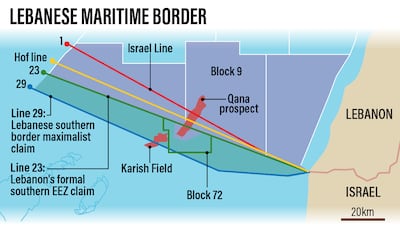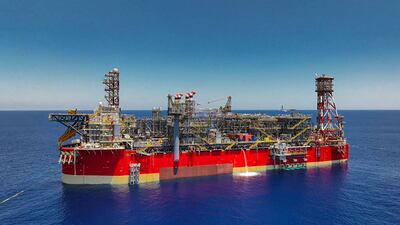Lebanon and Israel are rapidly closing in on a maritime border deal, with only one significant issue to be resolved, The National has learnt.
But officials stress that nothing is certain until the historic agreement is signed.
Negotiations have picked up on the sidelines of this week's UN General Assembly in New York, where US mediator Amos Hochstein is holding separate meetings with Lebanese and Israeli officials.
The National reported on Monday that Elias Bou Saab, Lebanon’s lead negotiator on the border issue, was in New York before the arrival of Prime Minister Najib Mikati.
After 15 months of indirect negotiations and shuttle diplomacy by Mr Hochstein between Lebanon and Israel, the deal is now regarded as near completion.
Mr Hochstein and Mr Mikati met on Tuesday, along with Brett McGurk, the US National Security Council Middle East director.
Mr Mikati also met US Secretary of State Antony Blinken. Following their meeting, the Lebanese prime minister confirmed that negotiations are in the final stages and struck a positive tone about a potential deal.
“The main topic was the delineation of the border and we are hopeful that we are in the final steps [of negotiations],” he said.
At stake in the long-running maritime dispute is access to and control of what are thought to be highly productive oil and gasfields that straddle both sides of the border.
A resolution would delineate the maritime border between Lebanon and its southern neighbour for the first time since Israel was established in 1948. The two nations are bitter foes and have fought several conflicts.

The main outstanding issue to be resolved involves a continuing dispute over the coastal land border of Ras Al Naqoura, The National understands.
Control over a five-kilometre stretch of the border from the north-western corner of Israel into the sea remains contested, with Israel concerned about security in the area.
Other aspects of the dispute that still need to be resolved are seen as matters for the Lebanese Parliament to address and are not considered deal-breakers.
One issue was who would fill in after Russian gas company Novatek left a hydrocarbon exploration consortium, but on Monday, Lebanon said it would take over its 20 per cent share.
Critical to any agreement, however, is the issue of time and finalising the text before October 1, when Israel plans to start extracting gas from the Karish field under an agreement with London-based gas explorer Energean.
Israeli Prime Minister Yair Lapid’s office on Monday said that gas production would begin as planned and was unrelated to the continuing negotiations with Lebanon.
However, the Lebanese government and the militant group Hezbollah have warned against such a move.
The party's leader, Hassan Nasrallah, said Hezbollah has “sent a very strong message, far from the media, that [Israel] faces a problem if it begins extraction from the Karish field before Lebanon obtains its rightful demands”.
Israel is seeking to avoid a clash around Karish, a diplomatic western source said, despite the public statements. This puts negotiations at a make-or-break moment before October 1.
Diana El Kaissy, an energy governance specialist and advisory board member of the Lebanese Oil and Gas Initiative, saw a vested interest for all stakeholders to finalise the deal in the coming days.
“This is a very political negotiation for Lebanon,” Ms El Kaissy told The National.
Getting to a deal before his term in office ends on October 31 would allow Lebanese President Michel Aoun to score a rare legacy point at a time of deep economic crisis.
Israel, Ms El Kaissy said, has interest in ensuring a deal “so that Energean can proceed with its commercial commitment in extracting gas from Karish and sending it to Europe”.
If Hezbollah acts on its threat and the two sides enter a military confrontation, such a commercial agreement would be disrupted.
US President Joe Biden's administration is also keen to deliver a breakthrough in the Middle East, Ms El Kaissy added.
Asked about the Ras Al Naqoura hurdle, Ms El Kaissy described it as a “main issue”, especially with Beirut settling for Line 23 in the negotiations (see map), instead of a larger area under Line 29. This makes the area around the Ras Al Naqoura border even more critical for Lebanon.
“We need clarity and transparency from Beirut on what is being handed in that coastal area,” Ms El Kaissy said. She referenced the UN's role in supervising and possibly overseeing any arrangement in that area.
If an agreement is reached between Lebanon and Israel through US mediation, the legal framework will be guaranteed by the UN through a document agreed on by all parties.
In a January 2022 letter to UN Secretary General Antonio Guterres, Lebanon drew attention to the framework agreement sponsored by the US and the UN.
It called upon the Security Council to ensure that drilling appraisal work does not occur in the disputed area to avoid any encroachment on the rights and sovereignty of Lebanon.

